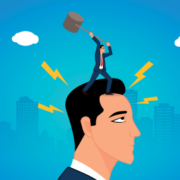How Better Hearing Improves Romance
Hear With All Your Heart
“My Darling Gave Me Hearing Aids for Valentine’s Day” will never climb the Billboard charts. It’s not even a real song. But the sentiment is spot on.
Hearing aids don’t suggest romance. The proven link between better hearing and better relationships does, though. And “relationships” means everyone, from the cashier at the store to coworkers to, yes, even your most significant, intimate ones.
You can enjoy deep, emotional connections if you have untreated hearing loss. It means being more intentional and making adjustments. However, hearing loss sneaks up on you. Many don’t even realize they have it.
But treating your hearing loss can easily improve this most important of relationships and keep that connection strong.
Better Hearing, Less Miscommunication
Stakes are high in romantic relationships. Strong communication keeps both parties feeling seen, appreciated, and valued. Treating hearing loss is a small price to pay for dramatically lowering the chance of miscommunication.
To highlight just a couple of important benefits:
- No more whispering sweet nothings to your partner, only to get the response, “What!?”
- Banter will be energizing again — listening with a hearing loss takes more energy.
Hearing your best means a more harmonious relationship, less confusion about plans, and more time for each other.
Better Hearing, Less Frustration
When you have hearing loss, responsibilities shift. They have to answer the doorbell, call to schedule appointments, or even respond for you in social situations if you miss a question. No matter how understanding your partner is, frustration can settle in.
Hearing your best shifts things. You can hear the timer go off and tend to the turkey. You can hear, acknowledge, and respond to a shift in your partner’s tone of voice. You can recount a funny story you heard over coffee with a friend.
It might not seem like much, but it’s these little gestures that show you’re an attentive and committed partner.
Better Hearing, Less Distance
You might not even notice it, but when conversations start to become difficult or even embarrassing because of your hearing loss, you withdraw a bit. You might even avoid interacting with your partner.
But better hearing means more confidence in conversations, making you both more proactive about engaging each other.
Better Hearing, More Affection
Intimacy and affection are built over time from small, shared experiences such as inside jokes, enjoying movies or music together, and vacation mishaps.
Hearing better means once again enjoying those beloved subtleties in your partner’s voice, the nuances of the first song you danced to, and the humor in that oft-quote movie dialogue they love so much.
Tips for Date Night
If you’ve just started your better-hearing journey, here are some strategies to ensure your first date as a hearing aid wearer goes great.
Be Practical About the Location
Don’t set yourself up for failure. If you’re still learning how your hearing devices perform in different environments, choose somewhere quiet. Head to the park for a picnic, stay in and cook dinner together, or choose a quiet restaurant. If you’re past the adjustment phase, consider your limitations when choosing the venue.
Be Early
Restaurants are more crowded the later you arrive — go early and beat the crowds. You get a quieter atmosphere and excellent happy-hour prices. You’ll also have a better chance at being seated away from kitchen and loudspeaker noise.
Be Prepared
Put fresh batteries in your devices or, if you have rechargeable devices, ensure they have enough charge to last you through the evening. Give your devices a maintenance once-over as well, to clear them of earwax and debris.
Be Your Own Advocate
Let your partner know the best ways to communicate with you. If they need to switch seats or talk slower, tell them. They’ll be grateful for the feedback. They want your time together to be special, too. And don’t be shy with the staff — let them know what your needs are, such as a table away from excessive noise.
Consider an Upgrade
What If you already have hearing aids?
Your hearing changes over time because of age, loud sounds, and general health issues. If it’s changed enough, it can be much like if you have an untreated hearing loss — and the issues that come with it.
We can adjust your programming to meet your needs, but if your hearing has changed too much, you might need a different level of technology. Here are some other things that might affect whether your technology still meets your needs.
Malfunctioning Devices
What if you do regular DIY maintenance and get your devices cleaned and checked regularly, but things still aren’t right? Occasional repair is one thing, but if your devices regularly malfunction, it’s time to replace them.
Costly Repairs
Older devices get discontinued. Parts for older devices become scarce. Eventually, repairing your devices costs so much that it makes more sense to simply replace them.
Evolving Technology
Devices have advanced significantly. Filtering of background noise gets better and better, rechargeability is now commonplace (no fiddling with tiny batteries!), tinnitus management is a standard feature, and so is direct wireless streaming from smartphones and other audio sources.
New Interests or Environments
With lifestyle changes often come different tech needs. Took up a sport? You might need moisture resistance. Switched from an office to a job outdoors? You’ll likely experience a different noise level now.
Are you wondering how your hearing is doing? Contact us today to schedule an appointment!





